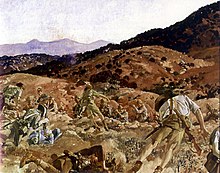
Back معركة ذا نيك Arabic Kılıçbayır döyüşü Azerbaijani Bataille du Nek French Battaglia di Nek Italian Batalha do Nek Portuguese Kılıçbayır Muharebesi Turkish
| Battle of the Nek | |||||||
|---|---|---|---|---|---|---|---|
| Part of World War I Gallipoli Campaign | |||||||
 The charge of the 3rd Light Horse Brigade at the Nek, 7 August 1915 by George Lambert, 1924. | |||||||
| |||||||
| Belligerents | |||||||
|
| |||||||
| Commanders and leaders | |||||||
|
|
| ||||||
| Units involved | |||||||
| Strength | |||||||
| 600 | Unknown | ||||||
| Casualties and losses | |||||||
| 372 killed and wounded | At least 12 | ||||||
The Battle of the Nek (Turkish: Kılıçbayır Muharebesi) was a minor battle that took place on 7 August 1915, during the Gallipoli campaign of World War I. "The Nek" was a narrow stretch of ridge on the Gallipoli Peninsula. The name derives from the Afrikaans word for a "mountain pass" but the terrain itself was a perfect bottleneck and easy to defend, as had been proven during an Ottoman attack in June. It connected Australian and New Zealand trenches on the ridge known as "Russell's Top" to the knoll called "Baby 700" on which the Ottoman defenders were entrenched.
The campaign on the Gallipoli Peninsula had begun in April 1915, but over the following months had developed into a stalemate. In an effort to break the deadlock, the British and their allies launched an offensive to capture the Sari Bair range. As part of this effort, a feint attack by Australian troops was planned at the Nek to support New Zealand troops assaulting Chunuk Bair.
Early on 7 August 1915, two regiments of the Australian 3rd Light Horse Brigade, one of the formations under the command of Major General Alexander Godley for the offensive, mounted a futile bayonet attack on the Ottoman trenches on Baby 700. Due to poor co-ordination and inflexible decision making, the Australians suffered heavy casualties for no gain. A total of 600 Australians took part in the assault, assaulting in four waves; 372 were killed or wounded. Ottoman casualties were negligible.